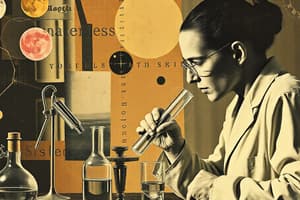Podcast
Questions and Answers
Which of the following scenarios best exemplifies the application of empirical evidence in scientific research?
Which of the following scenarios best exemplifies the application of empirical evidence in scientific research?
- Relying on a respected scientist's opinion to validate a hypothesis.
- Collecting data through experiments to test a specific hypothesis. (correct)
- Conducting a survey to gather public opinions on a scientific topic.
- Developing a mathematical model based on theoretical assumptions.
A researcher proposes a new theory but avoids making specific predictions that can be tested through experiments. Why is this problematic from a scientific standpoint?
A researcher proposes a new theory but avoids making specific predictions that can be tested through experiments. Why is this problematic from a scientific standpoint?
- The theory does not align with existing beliefs.
- The theory is not complex enough to explain the phenomenon.
- The theory lacks a mathematical foundation.
- The theory is not falsifiable, hindering its validation. (correct)
A team of scientists is studying the behavior of a new chemical compound. To ensure objectivity, what steps should they take during their research?
A team of scientists is studying the behavior of a new chemical compound. To ensure objectivity, what steps should they take during their research?
- Incorporate personal opinions to enrich the analysis.
- Minimize bias in data collection and interpretation. (correct)
- Rely on anecdotal evidence from previous studies.
- Focus solely on data that supports their initial hypothesis.
A physicist is investigating the properties of a newly discovered subatomic particle. Which branch of science is most relevant to this research?
A physicist is investigating the properties of a newly discovered subatomic particle. Which branch of science is most relevant to this research?
An economist is studying the factors that influence consumer spending during an economic recession. Which branch of science does this research fall under?
An economist is studying the factors that influence consumer spending during an economic recession. Which branch of science does this research fall under?
A computer scientist is developing a new algorithm to improve data encryption. Which branch of science is most applicable to this work?
A computer scientist is developing a new algorithm to improve data encryption. Which branch of science is most applicable to this work?
A researcher is studying the impact of a new teaching method on student test scores. Which step in the scientific method involves formulating a testable explanation for the expected outcome?
A researcher is studying the impact of a new teaching method on student test scores. Which step in the scientific method involves formulating a testable explanation for the expected outcome?
After conducting numerous experiments, a team of scientists finds consistent evidence supporting a particular explanation for a natural phenomenon. What might this explanation be classified as?
After conducting numerous experiments, a team of scientists finds consistent evidence supporting a particular explanation for a natural phenomenon. What might this explanation be classified as?
Which of the following best exemplifies a scientific law?
Which of the following best exemplifies a scientific law?
Why are standardized units, such as SI units, essential in scientific measurements?
Why are standardized units, such as SI units, essential in scientific measurements?
A researcher wants to analyze the chemical composition of a distant star. Which tool would be most appropriate?
A researcher wants to analyze the chemical composition of a distant star. Which tool would be most appropriate?
How does scientific research contribute to improved health and medicine?
How does scientific research contribute to improved health and medicine?
What is the primary purpose of peer review in the scientific process?
What is the primary purpose of peer review in the scientific process?
Which behavior violates ethical considerations in science?
Which behavior violates ethical considerations in science?
Which of the following is a characteristic of pseudoscience?
Which of the following is a characteristic of pseudoscience?
In what way is calculus essential to scientific modeling?
In what way is calculus essential to scientific modeling?
How does the interdisciplinary nature of science contribute to scientific advancements?
How does the interdisciplinary nature of science contribute to scientific advancements?
What is the significance of studying environmental science?
What is the significance of studying environmental science?
Flashcards
What is Science?
What is Science?
A systematic approach to understanding the natural world through observation, experimentation, and analysis.
Empirical Evidence
Empirical Evidence
Facts obtained through observation and experimentation; the foundation of scientific claims.
Testability
Testability
The principle that scientific claims must be falsifiable, meaning they can be tested and proven wrong..
What are Natural Sciences?
What are Natural Sciences?
Signup and view all the flashcards
What are Social Sciences?
What are Social Sciences?
Signup and view all the flashcards
What are Formal Sciences?
What are Formal Sciences?
Signup and view all the flashcards
What is the Scientific Method?
What is the Scientific Method?
Signup and view all the flashcards
Scientific Theory
Scientific Theory
Signup and view all the flashcards
Scientific Law
Scientific Law
Signup and view all the flashcards
Microscopes
Microscopes
Signup and view all the flashcards
Scientific Journals
Scientific Journals
Signup and view all the flashcards
Pseudoscience
Pseudoscience
Signup and view all the flashcards
Quantitative Analysis
Quantitative Analysis
Signup and view all the flashcards
Big Data
Big Data
Signup and view all the flashcards
SI Units
SI Units
Signup and view all the flashcards
Peer Review
Peer Review
Signup and view all the flashcards
Environmental Science
Environmental Science
Signup and view all the flashcards
Standardized Units
Standardized Units
Signup and view all the flashcards
Study Notes
The provided text is identical to the existing notes. There is nothing new to add.
Studying That Suits You
Use AI to generate personalized quizzes and flashcards to suit your learning preferences.
Description
Explore the systematic approach of science, focusing on understanding the natural world through observation, experimentation, and analysis. Learn about the core principles of science, including empirical evidence, testability, objectivity, repeatability, and skepticism. Discover main branches of science.




